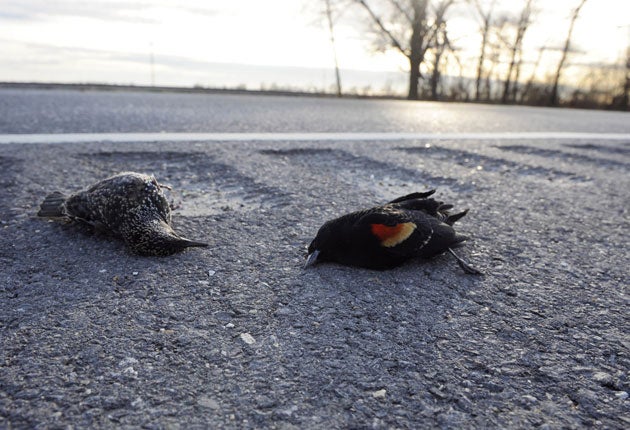It's raining birds and frogs: Animal phenomena are surprisingly common but why do they happen?
Worm showers, falling fish – these animal phenomena are surprisingly common. But why do they happen?

Your support helps us to tell the story
From reproductive rights to climate change to Big Tech, The Independent is on the ground when the story is developing. Whether it's investigating the financials of Elon Musk's pro-Trump PAC or producing our latest documentary, 'The A Word', which shines a light on the American women fighting for reproductive rights, we know how important it is to parse out the facts from the messaging.
At such a critical moment in US history, we need reporters on the ground. Your donation allows us to keep sending journalists to speak to both sides of the story.
The Independent is trusted by Americans across the entire political spectrum. And unlike many other quality news outlets, we choose not to lock Americans out of our reporting and analysis with paywalls. We believe quality journalism should be available to everyone, paid for by those who can afford it.
Your support makes all the difference.In Hitchcockian scenes last week, thousands of birds fell suddenly from the sky within a one-mile area of Beebe, near Little Rock, Arkansas. Most were found to have died from internal bleeding, but nobody has been able to come up with a convincing explanation for their dramatic demise, although a lightning strike, high-altitude hail and fireworks are some of the more rational suggestions. Then, earlier this week, another 500 red-winged blackbirds and starlings were found dead on a short stretch of highway, only 300 miles south of Beebe.
"It's raining cats and dogs" might be a common idiom to describe a heavy downpour, but a literal shower of animals is not as uncommon as we may think.
Just yesterday 40,000 devil crabs washed up on the Kent coast, thought to be the result of Britain's coldest December in 120 years.
There is a long history in the animal kingdom of mysterious mass behaviour and group deaths, and while some can be readily explained, others leave even the experts scratching their heads.
Falling fish
This is perhaps the most common occurrence of "raining animals". Most recently, Lajamunu, a town in Australia, reported thousands of fish falling from the sky last February. Lajamanu sits on the edge of the Tanami Desert, hundreds of miles from the closest lake and even further from the coast. The explanation? When winds are strong enough, particularly in thunderstorms, small whirlwinds and mini-tornadoes can form, which pick up fish when travelling over water, carrying them for miles, before dropping their peculiar cargo on top of baffled populations.
Raining frogs
Immortalised in a scene from Paul Thomas Anderson's film Magnolia, the explanation behind raining frogs is similar to that of fish. In another fairly common occurrence, horrified residents of Rakoczifalva, Hungary received a frog shower in a thunderstorm last June. In the Bible's Book of Exodus, God casts down a rain of frogs on the Egyptians for their refusal to free the Israelites, leading to it becoming a popular narrative device when exploring themes of forgiveness and redemption, such as in Magnolia.
Plague of locusts
Australia is currently in the midst of a serious locust problem, with billions of the insect threatening to be a major nuisance. The warm, wet weather during their last summer meant that three generations of locusts were born, each one up to 150 times larger than the previous generation. They are now hatching and entire departments have been set up in a bid to limit damage to crops and general interference with society.
Worm shower
In 1872, worms were reported falling in Somerville, Massachusetts; in 1877 in Christiana, Norway, and in 1969 in the Cotswolds. In 2007, a woman crossing the road in Jennings, Louisiana, experienced large clumps of tangled, live worms falling from the sky. The answer to this phenomenon may lie in the waterspout seen less than five miles away in Jennings, suggesting the vortex sucked up the worms before dumping them on the unsuspecting victim.
Beached whales
A group of beached whales is a sad but not uncommon sight and can occur in groups of up to 300. While cases have been reported all over the world, scientists are yet to ascertain why they become stranded. One main theory is rough weather, another is the disturbance of echolocation, possibly by interference from sound produced by human activities at sea, such as military sonar, with the whales' strong social bond meaning they follow each other to their deaths. New Zealand has the world's highest rate of strandings, with 5000 recorded since 1840.
Join our commenting forum
Join thought-provoking conversations, follow other Independent readers and see their replies
Comments